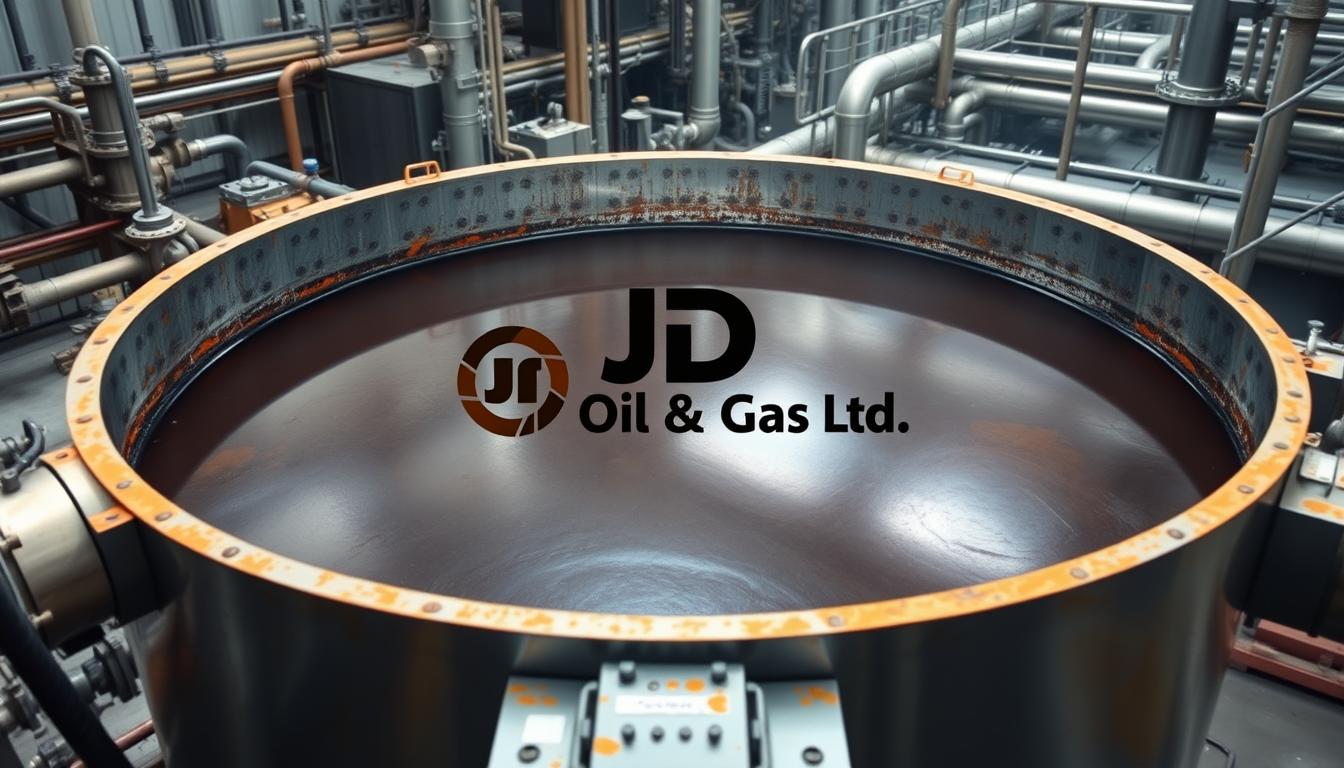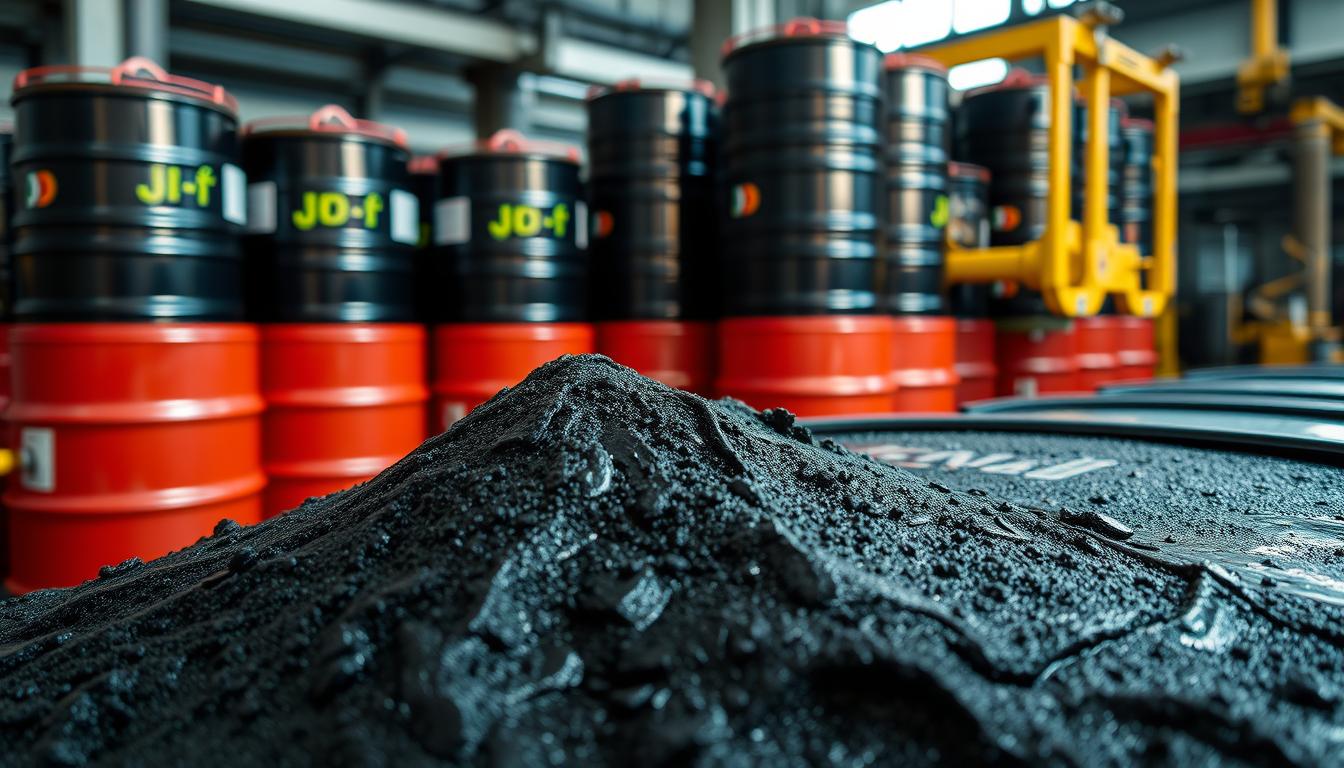The future of transportation and energy depends on high-quality diesel fuel. EN590 10PPM is a top standard for fuel excellence. It ensures engines run well and is good for the environment. Let’s explore what makes EN590 10PPM special for modern diesel engines.
Key Takeaways
- EN590 10PPM is a premium diesel fuel standard that meets strict European quality requirements.
- This fuel delivers enhanced engine performance, improved fuel efficiency, and reduced emissions.
- EN590 10PPM’s low-sulfur content and advanced additives make it an environmentally friendly choice.
- Compliance with EN590 10PPM ensures your diesel engine operates at its optimal level.
- Understanding the technical specifications and quality control measures of EN590 10PPM is crucial for diesel vehicle owners.
Understanding Premium Diesel Fuel Basics
The quality of diesel fuel is key for our vehicles’ performance, efficiency, and life span. Premium diesel fuel, like EN590 10PPM, meets modern diesel engine needs. It offers benefits that standard diesel doesn’t.
Key Components of High-Quality Diesel
Premium diesel fuel’s top performance comes from its special mix. It includes specific additives and meets strict standards. These ensure the fuel’s quality.
- Cetane number: A measure of the fuel’s ignition quality, ensuring smooth and efficient combustion.
- Density and viscosity: Optimized levels that enhance lubrication and reduce wear on critical engine components.
- Cold-flow properties: Formulated to maintain fluidity and prevent issues in colder climates.
The Evolution of Diesel Standards
Diesel fuel standards have changed over time. They’ve kept up with engine tech and environmental rules. Low-sulfur diesel, for example, cuts harmful emissions, improving air quality.
Modern Diesel Fuel Requirements
Today’s diesel engines need high-quality fuel that meets strict specs. They require better lubricity, less soot, and more efficient burning. This ensures better engine performance, fuel use, and life.
Knowing about diesel fuel’s components and standards helps us choose the best fuel. This choice unlocks our vehicles’ full potential. It also helps make our future cleaner and more sustainable.
EN590 10PPM: The Gold Standard in Diesel Fuel
The EN590 10PPM standard is seen as the top choice for diesel fuel today. It’s a European standard that ensures diesel fuel is clean, efficient, and eco-friendly. It has a very low sulfur content of just 10 parts per million (PPM).
The 10PPM sulfur level is very important. It’s a big step up from older diesel fuels that had much more sulfur. This cleaner diesel fuel cuts down on harmful emissions. It also helps engines last longer and work better.
| Fuel Specification | Sulfur Content (PPM) | Environmental Impact |
|---|---|---|
| EN590 10PPM | 10 | Significantly reduced emissions and improved air quality |
| Conventional Diesel | 500+ | Higher emissions and negative impact on air quality |
The EN590 10PPM standard shows the industry’s dedication to cleaner fuels. It has led to better engine technology and a greener future for transport.
“EN590 10PPM diesel fuel is the benchmark for modern, high-performance, and environmentally-friendly diesel engines.”
As we aim for a more sustainable world, EN590 10PPM is a key example. It shows what’s possible when everyone works together for a better future.
Environmental Benefits of Low-Sulfur Diesel
Low-sulfur diesel, like EN590 10PPM, is key for cleaner transport. It meets strict emission rules and offers big environmental wins. These benefits help our communities a lot.
Reduced Emissions and Air Quality Impact
Lower sulfur in diesel fuel is a big step for cleaner air. It burns better, cutting down on harmful emissions. This makes the air in cities better, lowering health risks from pollution.
Ecosystem Protection Measures
- Low-sulfur diesel cuts down on harmful pollutants, protecting our ecosystems and habitats.
- It also lowers the chance of acid rain, which harms plants and animals.
- With less sulfur, our soil and water stay cleaner, keeping our natural resources healthy.
Carbon Footprint Considerations
Using low-sulfur diesel also helps reduce our carbon footprint. It makes engines more efficient and cuts down on emissions. This helps fight climate change, making our planet a bit greener.
| Environmental Impact | Conventional Diesel | Low-Sulfur Diesel (EN590 10PPM) |
|---|---|---|
| Particulate Matter Emissions | Higher | Lower |
| Nitrogen Oxide Emissions | Higher | Lower |
| Soil and Water Contamination | Higher | Lower |
| Carbon Footprint | Higher | Lower |
Choosing low-sulfur diesel fuels helps us move towards a cleaner future. It also brings performance benefits, thanks to diesel fuel regulations.
Global Compliance and Regulatory Framework
The world is now more aware of the environment, leading to big changes in diesel fuel rules. The EN590 standard is at the center of this change. It’s now the top standard for diesel fuel quality worldwide.
The EN590 standard was made by the European Committee for Standardization (CEN). It outlines strict rules for making and selling top-notch diesel fuel. Many places in Europe follow this standard. Other areas are also adopting it to improve air quality and fuel performance.
- The EN590 standard limits sulfur in diesel to 10 parts per million (ppm). This is much lower than before. It helps cut down on emissions and makes the air cleaner.
- Worldwide, governments are making their diesel fuel regulations match the EN590 standard. This ensures everyone gets high-quality fuel.
- The EN590 standard is now the top diesel fuel standard globally. It pushes the industry towards cleaner, better fuel.
Even though many places follow the EN590 standard, making it global is still hard. Issues like different infrastructure and economic factors can make it tough. But, groups like the International Energy Agency (IEA) and the United Nations Environment Programme (UNEP) are helping. They work to make diesel fuel regulations the same everywhere.
“Moving to cleaner, better diesel fuel is key to fighting the global climate crisis. By setting our standards and rules the same, we can make a big difference. This will help us create a more sustainable future.”
As the world keeps changing, it’s clear we need a consistent, green approach to diesel fuel. By following the EN590 standard and working towards global rules, we can make the future greener and better for everyone.
Premium Diesel Fuel Properties and Specifications
Diesel fuel quality is key. Premium fuels like EN590 10PPM meet strict standards for top-notch performance. Let’s explore what makes these fuels stand out.
Cetane Number Requirements
The cetane number shows how well a diesel fuel ignites. Premium fuels have cetane numbers between 51 and 58. This means they burn cleaner and start engines better, even in cold weather.
Density and Viscosity Standards
Density and viscosity are crucial for premium diesel fuels like EN590 10PPM. They ensure the fuel atomizes right, lubricates engines, and flows well in all temperatures.
Cold Flow Properties
Diesel engines face challenges in cold weather. Premium fuels are made to flow well even when it’s freezing. This is thanks to special additives and precise refining.
Knowing about premium diesel fuel properties shows the effort put into making these fuels. This effort leads to better engine performance, less maintenance, and a greener environment.
| Specification | Standard Diesel | EN590 10PPM Premium Diesel |
|---|---|---|
| Cetane Number | 45-52 | 51-58 |
| Density (kg/m³) | 820-845 | 833-837 |
| Viscosity (mm²/s) | 2.0-4.5 | 2.3-3.3 |
| Cold Filter Plugging Point (°C) | -10 to -5 | -20 to -15 |
Understanding premium diesel fuel like EN590 10PPM shows the quality and care in making these fuels. This quality leads to better engine performance, less maintenance, and a greener environment.
Quality Control Measures in Diesel Production
Keeping diesel fuel quality high, like the EN590 10PPM standard, is key for the fuel industry. Quality control steps are strict from start to finish. This includes testing, monitoring, and quality checks at every stage.
At the refinery, advanced tools and skilled people test the diesel fuel at different stages. They check things like cetane number, density, and viscosity. These checks make sure the fuel meets the EN590 10PPM standards.
| Quality Control Measure | Purpose |
|---|---|
| Cetane Number Testing | Ensures optimal engine performance and emissions |
| Density and Viscosity Monitoring | Maintains fuel efficiency and engine lubrication |
| Cold Flow Property Evaluation | Prevents fuel gelling and ensures operability in low temperatures |
| Sulfur Content Analysis | Verifies compliance with environmental regulations and protects exhaust systems |
The diesel fuel distribution network is also important for quality. Tanks, pipelines, and vehicles are kept clean to avoid contamination. Regular checks and audits help keep the fuel up to standard.
Thanks to these quality control steps, the fuel industry can offer top-notch diesel fuel quality. This meets the needs of modern engines and environmental rules. It ensures high-quality diesel fuels, like the EN590 standard, work well and are good for the environment.
Performance Benefits of Premium Diesel Fuel
The quality of fuel we use in our vehicles matters a lot. Premium diesel fuel, like the EN590 10PPM standard, brings many benefits. It can make our driving better and our engines last longer.
Engine Protection Features
Using high-quality diesel helps protect our engines. These fuels have special additives that clean and lubricate engine parts. This reduces wear and tear, making our engines last longer and work better.
Fuel Efficiency Improvements
Premium diesel fuel also makes our vehicles more fuel-efficient. Its high cetane number and combustion properties mean our cars go further on less fuel. This saves us money and is better for the environment.
Choosing clean diesel fuel that meets the EN590 10PPM standard is a smart move. It offers long-term benefits like better reliability, lower maintenance costs, and a more enjoyable drive.
Storage and Handling Requirements
Keeping premium diesel fuels, like EN590 10PPM, in top shape is key for great engine performance and meeting environmental rules. To keep diesel fuel standards up, it’s important to follow the right storage and handling steps. This is true from the start of production to when it’s used.
Storing diesel fuel right is crucial to avoid contamination and spoilage. This means picking the right tanks, keeping them clean, and controlling temperature and humidity. Regular checks and quality control steps can help avoid diesel fuel problems.
When moving diesel fuel, keeping its quality is just as important. Using careful loading, unloading, and handling, and clean transport gear helps keep the fuel pure and effective.
At the fueling station, keeping the fuel quality is a must. Using the right filters, controlling temperature, and following best practices ensures the fuel is top-notch. This way, users get the best EN590 10PPM diesel fuel that meets all standards.
Best Practices for Diesel Fuel Storage and Handling
- Select appropriate storage tanks with proper seals and venting to prevent contamination
- Regularly inspect and clean storage facilities to maintain cleanliness
- Control temperature and humidity levels to avoid fuel degradation
- Implement quality control measures, such as routine sampling and testing
- Use dedicated, clean transportation equipment for diesel fuel delivery
- Ensure proper filtration and temperature control at the point of dispensing
| Storage Parameter | Recommended Range |
|---|---|
| Temperature | 10°C to 30°C (50°F to 86°F) |
| Humidity | 40% to 60% relative humidity |
| Cleanliness | Free from contaminants, debris, and water |
Following these storage and handling tips helps keep diesel fuel standards, like EN590 10PPM, up. This ensures engines run well and helps the environment.
Cost Considerations and Economic Impact
Premium diesel fuel, like the EN590 10PPM standard, costs a bit more than regular diesel at first. But, the benefits over time are huge. These advanced diesel fuel regulations offer great value.
Long-term Value Analysis
The initial cost of EN590 standard diesel might seem high. But, the long-term savings and better performance make it worth it. These premium fuels protect engines, improve fuel efficiency, and cut down on maintenance. This leads to big savings over time.
Market Price Factors
The price of premium diesel fuel changes due to many things. These include supply and demand, how much is made, shipping costs, and government rules. As more people want cleaner, better fuels, the price gap between standard and premium diesel might get smaller. This makes EN590 10PPM diesel a better choice for many.
| Fuel Type | Average Price (per liter) | Fuel Efficiency (km/liter) | Maintenance Savings |
|---|---|---|---|
| Standard Diesel | $1.50 | 8.5 | $200 per year |
| EN590 10PPM Diesel | $1.60 | 9.0 | $300 per year |
The table shows the cost and performance differences between standard and premium diesel fuel. Even though EN590 10PPM diesel costs a bit more upfront, the better fuel efficiency and lower maintenance costs save a lot in the long run. This is good for both consumers and businesses.
The world is moving towards cleaner, more efficient transport. Using advanced diesel fuel regulations like EN590 10PPM is key. Knowing the costs and benefits of these premium fuels helps everyone make smart choices. This balances short-term costs with long-term value and sustainability.
Future Trends in Diesel Fuel Standards
The diesel fuel industry is set for big changes in standards and rules. We’re looking for cleaner, more efficient energy. This means diesel fuel will get better at reducing emissions and running smoother.
Watch for more use of biodiesel and renewable diesel. These fuels can cut down on carbon emissions a lot. They help fight climate change. New diesel fuel standards will make it easier to use these fuels.
We also expect diesel fuel regulations to get tougher. Rules on sulfur content, cetane number, and cold-weather properties will improve. This will make the air cleaner and engines more efficient, helping the environment and users.
New tech like better injection systems and exhaust cleaners will shape clean diesel fuel standards. As these techs get better, rules will change to let them shine. This will make diesel fuel even better and more efficient.
The future of diesel fuel standards is bright and changing fast. By keeping up with these changes, the industry can make diesel fuel a reliable, efficient, and green choice for the future.
| Trend | Description |
|---|---|
| Alternative Diesel Fuels | Increased focus on biofuels like biodiesel and renewable diesel to reduce carbon footprint |
| Stricter Regulations | More stringent standards for sulfur content, cetane number, and cold-weather properties |
| Emerging Technologies | Advancements in engine and after-treatment systems to optimize diesel fuel performance |
“The future of diesel fuel standards is an exciting and rapidly evolving landscape, driven by the pursuit of cleaner, more efficient energy solutions.”
Conclusion
EN590 10PPM is the top standard for premium diesel fuel. We’ve looked at what makes it so special. It’s all about quality and how it helps our planet.
The rules for diesel fuel are strict and global. EN590 10PPM meets these standards. This means it runs your engine well, saves fuel, and is good for the environment.
Choosing EN590 10PPM is a smart move for your car and the planet. It keeps your vehicle running smoothly for a long time. It’s also a step towards a cleaner, greener future.








